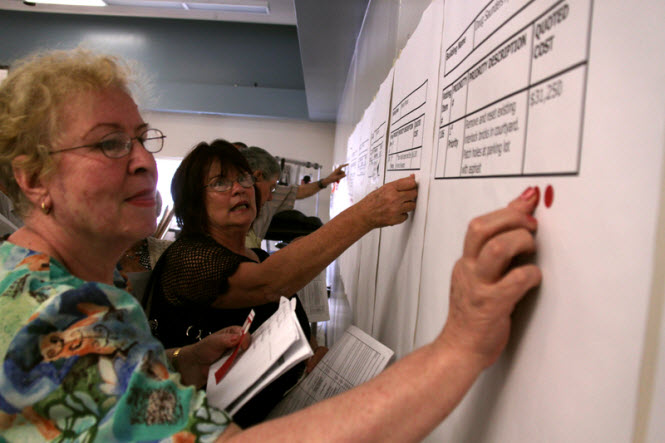 How would you like to decide along with your fellow citizens how to spend $1.3 million?! That’s what residents of Chicago’s 9th Ward have done by enacting Participatory Budgeting beginning in 2009.
How would you like to decide along with your fellow citizens how to spend $1.3 million?! That’s what residents of Chicago’s 9th Ward have done by enacting Participatory Budgeting beginning in 2009.
by Nancy Price
Clearly, solving the budget crisis this year and in following years will not be easy. At the same time, there is an opportunity to deal with the budget process differently than we have in the past by implementing “Participatory Budgeting.”
Briefly, Participatory Budgeting is a democratic process of discussion and decision-making by community members who together directly decide how to spend part of the public budget – that part not already allocated to fixed obligations such as debt service.
In general, the steps involved are: 1) community members meet, identify spending needs and set priorities, and elect budget delegates: 2) budget delegates develop specific spending proposals, with help from experts; and 3) community members vote on which proposals to fund; and 4) the municipality implements the proposals. In Davis, this process could work well to identify what are essential expenses, what can be reduced, and what can be cut. Because stakeholder groups are represented, it is inherently more democratic and transparent process than ultimately leaving the decisions to five City Council members and City staff.
Participatory Budging began in Porto Alegre, Brazil starting in 1989 after years of corruption left the city Bankrupt and and the essential needs of residents were not being met by the municipal government. It was a bold democratic experiment, one of a number of innovative reform programs implemented to reduce social and economic inequality and overcome the lack of meaningful political engagement in such a large, diverse city. At that time, in Porto Alegre, one-third of the city’s residents lacked access to essentials: water, sanitation, healthcare and schools.
Because of the way in which the community made budget decisions, by 2002 in Porto Alegre, 99% of the population had treated water and 85% had piped sewage. In 7 years, housing assistance jumped from 1,700 families to 29,000. In 12 years, the number of public schools increased from 29 to 86, and literacy reached 98 percent. Each year the bulk of new street-paving projects has gone to the poorer, outlying districts. So now, Porto Alegre has become one of Brazil’s most livable cities.
Today, around 50,000 residents, out of a population of 1.5 million, now take part in the budget process and allocate an average of $200 million each year for public projects and services.
Now in the United States, Chicago is the first city to try out this process. In November 2009, Alderman Joe Moore and the residents of Chicago’s 49th Ward launched a participatory budgeting process in consultation with the North American Participatory Budgeting Project. In a series of public meetings and voting over 6 months, community members decided how to spend Moore’s $1.3 million discretionary budget. The process began by bringing together over 50 civic,religious, and community organizations, including schools, NGOs, and neighborhood groups to form a Steering Committee.
Through a series of workshops and meetings, the Steering Committee decided the basic structure and rules. The participatory budgeting process began in November 2009 with nine neighborhood assemblies in which residents identified, discussed, and prioritized infrastructure improvements for the ward, and selected community representatives. For the next four months, the representatives met in six committees: Parks & Environment, Public Safety, Street,
Traffic Safety, Transportation, and Art & Other Projects. During these meetings, they developed project proposals based on community priorities and consulted more with the community. In April 2010, all ward residents were invited to vote on the project proposals, and in the end, over 1,600 people turned out to decide on the budget.
This April , Josh Lerner, Co-Director of The Participatory Budgeting Project and Alderman Joe Moore of Chicago spoke at a gathering sponsored by a cross-section of community-based groups to discuss how Participatory Budgeting could be applied to San Francisco.
Why not consider this process for Davis? The people of Davis have a legitimate claim to be at the table to jointly decide how their money is spent and what they are willing to sacrifice, cut or defer in the way of public services and community programs.
Let’s be bold in our thinking about democratic civic engagement and learn more about how the participatory budget process could be applied in our community.
For information: Go to YouTube and search “Direct Democracy in Chicago” and consult The Participatory Budgeting Project at http://www.participatorybudgeting.org





[quote]Today, around 50,000 residents, out of a population of 1.5 million, now take part in the budget process and allocate an average of $200 million each year for public projects and services.[/quote]
And that is the problem. A very small subset (~2%) of UNELECTED special interest citizens are making the decisions. I’m all for public participation, but I can see possibilities of abuses of the system when you add this additional layer. Additionally, citizens are not necessarily aware of all the nuances in how the city functions, so are not necessarily the best ones to make that decision.
I might be for a system that gave SUGGESTIONS to the City Council/City on funding, but I’m not sure I agree with letting an arbitrary subset of citizens make funding decisions. Special interest groups could really game this system…